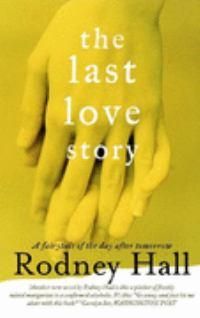
- Free Article: No
- Review Article: Yes
- Article Title: Trapped by Their Own Defences
- Online Only: No
- Custom Highlight Text:
There is often a speculative dimension to Rodney Hall’s fiction. Throughout his long career, he has tended to build his novels around alternative histories or unusual possibilities. Past works have imagined scenarios as diverse as Adolf Hitler arriving on the south coast of New South Wales and (where does he get his ideas?) Australia becoming a republic. The Last Love Story is in some respects unrepresentative of Hall’s vivid and expansive body of work. Compared to some of his earlier novels, it is concise and the natural flamboyance of his writing seems a little subdued. The novel does, however, develop from a typically interesting ‘what if?’
- Book 1 Title: The Last Love Story
- Book 1 Biblio: Picador, $22 pb, 256 pp
- Book 1 Cover Small (400 x 600):

- Book 1 Cover (800 x 1200):

The Last Love Story depicts a future where the political order has deteriorated. In an uncertain environment, people’s fears have begun to find release in superstition and hatred; nations have begun to fracture into city states under the pressure. The unidentified city where the novel is set has long been plagued by social tensions, which eventually spill over into a civil war, leading to a decisive split. The river that divides the city along its east–west axis becomes a heavily guarded border, and the city’s poorer northern half is left under the control of a fundamentalist Christian régime so bigoted and irrational that it still views Galileo with suspicion.
On one level, the book’s interest in authoritarianism is an extension of Hall’s previous novel, The Day We Had Hitler Home (2000). That book’s narrator, Audrey McNeil, witnesses the rise of Hitler and the steady poisoning of German society by the politics of racial hatred, an experience that finds its counterpoint in her affair with the African actor Bello. In a broad sense, The Last Love Story takes up this theme of an intensely personal experience conflicting with oppressive political forces. The fictional scaffolding that is hastily constructed in the opening pages is a backdrop for what is billed as a ‘fairytale’ about two lovers, Paul and Judith, who come from opposite sides of the divided city, and thus bring to their relationship an onerous burden of symbolism.
There are shades of Nineteen Eighty-Four in the way these lovers are eventually pitted against an inhuman régime, but it is also made clear that we are no longer dealing with the politics of Orwell’s day. The Lieutenant – an odious, if rather one-dimensional creation who is both gatekeeper and the novel’s spokesman for City North – dismisses fascism as:
a political delusion of the last century. One of those contemptible divisions on the basis of political theory. Communism and Capitalism, for goodness sake! Two Godless systems slaughtering each other over mere matters of opinion. As for us, we stand firm on the deepest issues of truth. The border right here, between City North and City South, is the reassertion of identity based on faith.
This is the crux of the novel as a political fable. The attraction of fundamentalism is in fact the same as that of ideology: it provides a sense of certainty. It shrinks the world to a comprehensible scale, giving shape to human existence at the same time as it obliterates the responsibilities of the self by making the individual part of something larger and, seemingly, irresistible. Even Paul, who has many reasons to resent the division, feels the pull of this certainty. The border, he thinks at one point, gives ‘structure to everything. Division being man’s destiny. In a certain sense other nations lacked the advantage of such clarity.’
There is a deeply rooted and understandable instinct at work here – a rational instinct in the sense that it springs from a need for self-protection. As an excuse, destiny is hard to beat. But this is the source of the novel’s tragedy. It creates a vicious cycle. Fear drives people to seek security, the price of which is repression and violence, which in turn creates more fear. ‘Put a fence around anything,’ says a character in one of Hall’s earlier novels, ‘and you condemn yourself to defending it.’ This is precisely the fate of the people in City North: they banish foreigners, seal themselves off from the rest of the world, and find themselves ‘trapped by their own defences’.
Running counter to this political nightmare is of course the love story itself. Like Romeo and Juliet, Paul and Judith meet at a party – in this case, a warehouse full of ravers on ecstasy, prompting one of the book’s most amusing lines when Hall describes the partygoers as ‘impatient to be freed into themselves – though routinely disillusioned by the emptiness they found there’. But unlike their Shakespearean counterparts, Paul and Judith do not experience love at first sight. Indeed, love is not idealised by the novel, even though it is allied with humankind’s more positive impulses (courage, trust, generosity and so on). For Paul, in particular, it is a complex and compromised emotion, tainted by shame, guilt and self-interest. His initial reasons for being drawn to Judith are less than admirable, and he has a strong sense that ‘people’s motives are troubled, and even joy moves on currents of melancholy and savagery’.
Nevertheless, love remains set against the edifices of politics because it is a matter of personal conscience. It requires trust, which is risky because it leaves you vulnerable. Its sincerity is thus a source of heroism and, like aestheticism, it is inexplicable to the authoritarian mind, which can only view it with suspicion. Just as the official religion of City North is stripped of its aesthetic content, the one possibility the Lieutenant cannot countenance is the truth: that Paul and Judith have no agenda beyond their devotion to each other, and that this is the sole reason they have put their safety at risk.
It is Judith who is the novel’s moral anchor. She is mentally ‘slow’, and her life is dominated by her overbearing mother, who, as an obvious counterweight to the Lieutenant, is a caricature of liberalism at its most complacent and self-satisfied. For Judith, her affair with Paul is an escape, a way to ‘break open a passage to the adult world, revealing the secret of how other people came to be free to make up their own minds’. Her ingenuousness gives her a certain purity of motive not possessed by the other characters, and her dignified resistance provides the novel with its final act of selfless heroism.
On one of Judith’s trips across the border, she encounters a writer with a ‘neat white beard’ who unsettles her by inferring the true nature of her journey. With the kind of prescience associated with Shakespeare’s soothsayers, he tells her that love is the best motivation to action, but also the ‘most doomed’. It is one of those self-referential moments that serves as a reminder that what we are reading is a work fiction. In context, it seems a little gratuitous. In fact, the novel’s main weakness lies in its overt ‘fairytaleness’, which corresponds to a certain thinness of characterisation and an overly tidy symmetry in the way it goes about asserting the moral authority of love over hatred and fear. But there are nevertheless some interesting ideas that emerge from The Last Love Story, particularly in its treatment of faith and the timely ethical question it ultimately raises: what good is a moral victory if it is also a practical defeat?


Comments powered by CComment